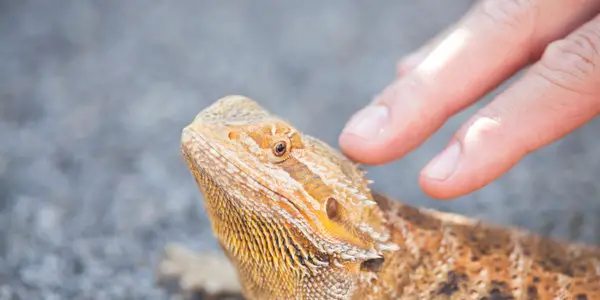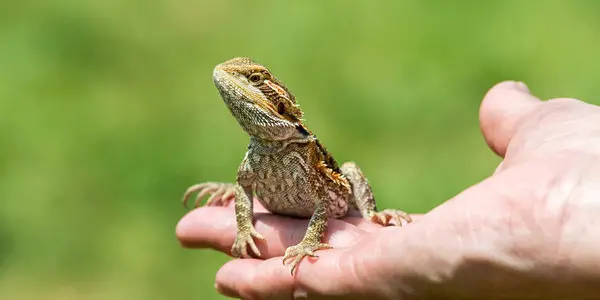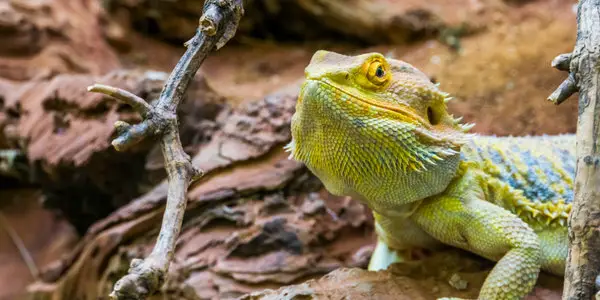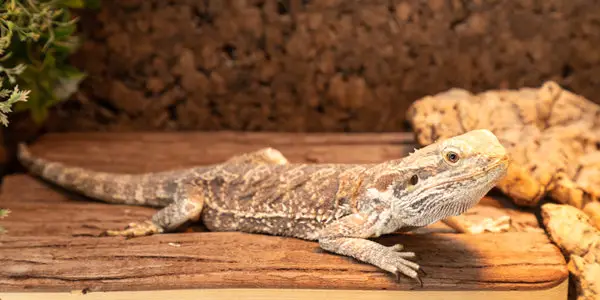Providing treats for your bearded dragon is a good practice. It helps them to fill up their nutritional needs to stay healthy. Adding insects for protein is excellent for your young beardie’s growth and development. A bearded dragon’s diet depends on its age. A young beardie versus an adult beardie has different nutritional requirements.
Wax worms are popular feeder insects for reptiles. It can add a variety from their usual diet. But can bearded dragons eat wax worms as well? That’s a good question that will be answered in their article. Keep reading and learn more about wax worms and bearded dragons’ diets.
Can Bearded Dragons Eat Wax Worms?
Yes, bearded dragons can eat wax worms. They are soft and highly palatable. It’s one reason why beardies like them, and they can easily be swallowed. But keep in mind that wax worms should only be given as an occasional treat. You should only provide wax worms sparingly to your beardie.
These worms should not be used as a staple food for bearded dragons. Wax worms don’t have much nutritional value to them.
They are not like other worms like butter worms, super worms, hornworms, etc. But wax worms can give a good amount of moisture and have low calcium to phosphorus ratio.
Wax Worm Nutritional Facts:
| Nutrient | Amount |
| Moisture | 61.7% |
| Protein | 15.5% |
| Fat | 22.2% |
| Fiber | 7.7% |
| Calcium | 283 ppm |
| Phosphorous | 2161 ppm |
| Ash | 1.02% |
Based on the nutritional facts of wax worms, these feeder insects have higher phosphorus than calcium. Wax worms are also high in fat which is 22.2%. They are also lower in protein which is only at 15.5%.
Can I Feed Wax Worms to My Bearded Dragon?
Yes, you can feed wax worms to your bearded dragon. Most owners provide them to their beardies occasionally. The key is to feed wax worms in moderation with less frequency. That’s how you should give wax worms to your beardie. It will let them experience new textures to enjoy.
Wax worms are the larvae of wax moths between 2.5cm to 1inch. They are tiny and have soft bodies. That’s why they are an excellent treat for bearded dragons.
Wax worms are low in protein but high in fat content. The calcium to phosphorus ratio is not good either.
If you overfeed your beardie with wax worms, it can cause health issues. Weight gain for adults, as well as problems with growth in young beardies, will be the result.
But it doesn’t mean that you should not offer wax worms to your bearded dragon. It’s an excellent idea to add calcium powder to balance its ratio.
Wax worms are tasty for beardies due to their fat content. They can be helpful for undernourished bearded dragons.
You can add a few wax worms to their salad to encourage them to eat more. Make sure to get the wax worms from a reputable source. It should be raised and harvested for reptile consumption to ensure its safety.
Can You Feed Wax Moths to Bearded Dragons?
Yes, wax moths can also be fed to bearded dragons. If you have tried feeding wax worms to your beardie, they will turn into wax moths after some time. Feeding the bearded dragons their larvae until they become wax moths is alright.
However, wax worms and wax moths don’t have much nutritional value for your beardie. They also tend to be very fatty.
It’s best to give them as a treat for bearded dragons instead. There’s no way you should make it their staple food since it’s not nutritious enough.
How Many Wax Worms Should I Feed My Bearded Dragon?
As mentioned, wax worms don’t offer many nutrients for bearded dragons. You can still feed it to your beardie at least once every other week. Depending on the age and size of your reptile is the number of wax worms that you can give them. Avoid exceeding the recommended amount to avoid health issues.
Babies and juveniles’ beardies are growing fast. They need to have a protein-rich diet to help them grow and develop.
The young bearded dragons can have 3 to 5 wax worms. Adults don’t need much protein as younger beardies do. Feed them 3 to 5 wax worms, but it should be less frequent.

What Worms Can Bearded Dragons Eat Instead of Wax Worms?
1. Butter Worms
Also known as trevo worms, butter worms are incredible feeder insects for bearded dragons. These worms are high in calcium and can be stored in the fridge longer. It can be gut-loaded before feeding it to your beardie for extra nutrition.
2. Hornworms
Hornworms can grow up to 4 inches long, and these are also a type of caterpillar. They are popular feeder insects for bearded dragons. It has a high amount of calcium and water content. Hornworms are usually treated since they are more expensive than other feeder insects.
3. Mealworms
It’s another popular live food for bearded dragons. Mealworms are low in protein but high in fat. It can cause obesity for beardies if you overfeed your beardie with mealworms. This type of worm should not be offered to young beardies since they need to get as much protein. It’s a good treat for adult beardies due to its flavor.
4. Super Worms
It’s similar to mealworms, but super worms are healthier. They contain more protein and less fat but are low in calcium. It’s a much healthier alternative to mealworms as a treat for your bearded dragons. You can feed young bearded dragons some super worms once a week.
5. Phoenix Worm
It’s an excellent choice for bearded dragons. Phoenix worms have high calcium content, protein, and phosphorus. There’s no need to gut load them anymore since it’s packed with essential nutrients. But it’s still a good idea to add calcium supplements in them for your bearded dragon.
6. Silkworms
Silkworms may be small, but they have good nutritional value. It contains iron, magnesium, Sodium, calcium, vitamins B1, B2, and B3. These worms can make a good staple food even for the young beardies. It’s packed with nutrients that they need to grow and develop.
Should Bearded Dragons Eat Dead Wax Worms?
It’s not recommended to feed bearded dragons with dead wax worms. Beardies enjoy eating live worms, and you should provide it to them. If you get some dead wax worms, it can be a health hazard for your bearded dragon. You’re not sure what exactly happened to them and how they died.
Live wax worms will wiggle from the container, and beardies can easily see them. Keep in mind that during the pupa stage, worms can change their color to black. Just make sure that you’re not buying dead worms. It can be dangerous for the beardie to eat, and that can cause health problems.
At What Age Can Bearded Dragons Eat Wax Worms?
If you have a baby bearded dragon, it’s not recommended to feed them wax worms. It’s best to wait until it turns one year old. Once they mature, you can already feed your beardie some wax worms. The reason for this is that wax worms are very high in fat.
The baby beardie’s digestive system is not strong enough yet. Wax worms are not suitable for them to consume.
When feeding worms to your beardie, make sure that you’re giving them food smaller than the space between their eyes. Make sure to get worms that are packed with nutrients as well.
How to Feed Bearded Dragons Live Foods?
In the wild, bearded dragons usually eat insects and vegetation. It should be the same for your pet beardie. Young beardies need to have 80% of their diet consist of protein. The remaining 20% should come from eating greens, fruits, and vegetables. As they mature, their nutritional needs will also change.
Adult bearded dragons will be eating less than their younger counterparts. During this stage, they need to eat more fruits and vegetables. But they still need to eat some worms and insects.
Their protein requirement is lower compared to young beardies. Still, bearded dragons need to feed on live foods. Below are some tips on how to do that.
- Make sure to give the feeder insects a nutritious plant-based diet before feeding it to your bearded dragon.
- Please choose the right size of live insects for your beardie, depending on its age.
- Give as many insects as the beardie can eat within 15 minutes.
- Remove any uneaten insects after the 15-minute mark.
- Dust the feeder insects with calcium supplement powder for reptiles before feeding it to your beardie.
- Offer feeder insects to your bearded dragon and make sure they eat them.
- Contain worms in a shallow dish to avoid them from escaping.
- If you have a young beardie, make sure to feed it at least once every day.
- Once the bearded dragon matures, it will only need 3 to 4x a week of feeding.

Why Are Wax Worms Good for Baby Bearded Dragons?
Baby bearded dragons require a protein-rich diet. It means that they need to eat more feeder insects than greens. If you’re thinking of feeding them wax worms, you can, but don’t make it a staple food. Wax worms contain too much fat than protein but occasionally treat beardies.
Wax worms can provide too much energy for baby beardies which can be bad for their health. It’s not recommended to feed your baby beardie wax worms frequently.
Crickets and other worms like super worms or silkworms are very nutritious. Wax worms are safe if you only provide them in limited amounts and less often.
What Worms are Bad for Bearded Dragons?
Bearded dragons can eat worms, and they seem to like it. But they are not considered staple feeder insects. Bearded dragons can eat them safely without any problems.
But it can be bad for them since overeating worms can cause some health issues. Worms may be suitable for snacks, but they should not be provided to beardies all the time.
Worms may contain too much fat, such as wax worms and super worms. Feeding your beardie too much fatty foods can be bad for them.
Overfeeding worms to them can cause obesity. Beardies can’t exercise as much as they can in the wild. Feed your bearded dragon a balanced and healthy diet instead to avoid them from becoming overweight.
Feeding your beardie super worms can cause impaction. They have a hard exoskeleton that is hard to digest. When beardies eat super worms, there will be some undigested parts that will stay in their stomach.
Bearded dragons can still digest them, but it can take a long time. This can cause your beardie to have gut impaction, which can be painful for these reptiles.
When the food is not digested, there will be a build-up inside the bearded dragon’s digestive tract. It can result in blockage. But sometimes, the blockage may be small and can be out of their body in time.
That’s good if it happens that way, but most of the time, it causes impaction. It can press on their nervous system and can even be fatal.
If your beardie is not defecating, it may be due to impaction. Symptoms of impaction are sluggishness, weight loss, can’t keep the food down, loss of appetite, lumps and difficulty walking.
If you notice any of these symptoms, take the beardie to the vet right away for treatment. That can avoid other complications that may occur.
Some worms will put up a good fight when they are about to be eaten by a bearded dragon. Superworms can bite, which can sting if you’re not careful.
Wear gloves and use tweezers to handle them. Keep an eye on your beardie while it feeds on super worms. They can be pretty aggressive, and they can be too much for your beardie to handle.
What Reptiles Can Eat Wax Worms?
Wax worms are used as food for insectivorous plants and animals that are in captivity. They are the larvae of wax moths.
These are grown extensively for birds, reptiles, and other pets. Wax worms have high-fat content, ease of breeding, and can survive for weeks even in cold environments
However, wax worms are recommended to offer as a treat for pets. They should not be considered staple food since they lack nutrients.
Unlike crickets and mealworms, wax worms can cause obesity. They are high in fat and calorie density which is hard to burn with low metabolism animals.
Wax worms are used to feed bearded dragons, neon tree dragons, geckos, brown anoles, turtles, and chameleons. It can also be provided to amphibians such as newts, Ceratophrys frogs, and salamanders like axolotls. They may lack nutrients, but they can be a good source of moisture.

What Insects Can Juvenile Bearded Dragons Eat?
Insects are an essential part of young bearded dragons’ diet. They are usually rich in protein which is one of the most vital nutrients in their growth and development.
Make sure that your beardie is eating the right amount based on age. It will help them become healthy and maintain it, and they grow and develop.
Bearded Dragon’s Favorite Insects
- Black soldier fly larvae
- Butterworms
- Crickets
- Dubia roaches
- Earthworms
- Locusts
- Redworms
Bearded dragons will eat just about any insects that they see crawling. Not all insects are good for bearded dragons to eat. Make sure that it’s eating safely to avoid any problems.
Provide your beardie with flavorful insects such as black soldier fly larvae, butter worms, cockroaches, crickets, Dubia roaches, earthworms, locusts, redworms, and super worms. They are safe and easy to find for your bearded dragon.
Insects Bearded Dragons Should Avoid
- Fireflies
- Elder Bugs
- Venomous insects, such as bees, wasps, and scorpions
- Any insects that glow
- Insects found outside
- Insects sold as bait for fishing
- Insects found inside your home
When you feed insects to your bearded dragon, allow it to eat as many bugs as it can eat for 15 minutes. Once it’s done, take out uneaten insects inside the enclosure.
Leaving uneaten feeder insects can put your beardie at risk of overeating. The insects may also burrow and hide inside the enclosure and cause problems inside the tank.
Find a reputable feeder insect supplier for reptiles. Don’t feed the beardie worms that are used as fishing bait. Avoid feeding the insects that you catch from the wild.
These insects may have traces of harsh chemicals from their environment. It can be dangerous for your bearded dragon to eat them.
You can also purchase feeder insects from your local pet stores and other breeders or suppliers online. Make sure that they are trustworthy feeder insect breeders.
Be vigilant when finding live insects to feed to your beardie. It will help you have peace of mind knowing it’s safe for your pet to consume without any potential hazard.
How Many Wax Worms Can a Baby Bearded Dragon Eat?
Bearded dragons’ diet should depend on their age and size. It will ensure that they will get a balanced and healthy diet. For babies and juveniles, they need more protein, and they can get it from insects. It should make up most of their diet every day to help them grow and develop properly.
Young bearded dragons need to eat more frequently than adult beardies. It’s because they tend to eat smaller amounts of food. For beardies under a year, they should eat about 80% of insects and 20% of greens. They also need to eat at least 3 to 5 small meals every day.
If the bearded dragon is over one year old, it will reach its maturity. During this time, their diet should be composed of 20 – 30% of insects and 70 – 80% of plant matter. The frequency of feeding should only be 3 to 5 times weekly. That should be enough to maintain their health throughout their adult life.
It’s recommended that beardies have cyclical eating, consisting of plant-feeding day, insect feeding, and no food day. Baby and juvenile bearded dragons should eat more insects.
Wax worms can be fed 3 to 5 times daily and other feedings. It should have a good portion with the right frequency. Feeder insects should be offered in higher quantities for young beardies.

FAQs
1. Can You Give Wax Worms To Bearded Dragons Regularly?
Wax worms should be added to your beardies diet occasionally. It’s high in fat and should only be used as a treat. Overfeeding your bearded dragon with wax worms can cause it to become overweight. It will be difficult for your beardie to move if it becomes obese.
2. Which is Better For Bearded Dragons, Wax Worms, or Mealworms?
Mealworms and wax worms may look the same. But they are different from each other when it comes to quality. Mealworms are smaller than wax worms. They both contain good enough protein, which is suitable for your beardie. But mealworms have less fat which makes it better for bearded dragons.
3. Do Bearded Dragons Like Wax Worms?
Yes, bearded dragons are like wax worms due to their taste. Wax worms are tasty, and beardies prepare them over other types of worms. Its soft texture also makes bearded dragons like them. If your beardie is refusing to eat, it’s best to offer wax worms to your pet. Feed it to your beardie sparingly since it’s high in fat which can cause obesity.
4. Can Wax Worms Be a Staple Food For Bearded Dragons?
No, wax worms should not become your bearded dragon’s staple diet. It lacks the essential nutrients the bearded dragon needs to stay healthy. Offer your beardie super worms or mealworms instead for less fat consumption. But only use it as an occasional treat for your beloved pet.
5. What is the Benefit of Wax Worms For Bearded Dragons?
Wax worms are tasty for bearded dragons. They are also juicy and have a good amount of protein. If the bearded dragon is inside due to a lack of protein, offer 5 to 6 mealworms to your pet. But make sure to feed it to your beardie sparingly. Wax worms are high in fat which can make your beardie fat.
